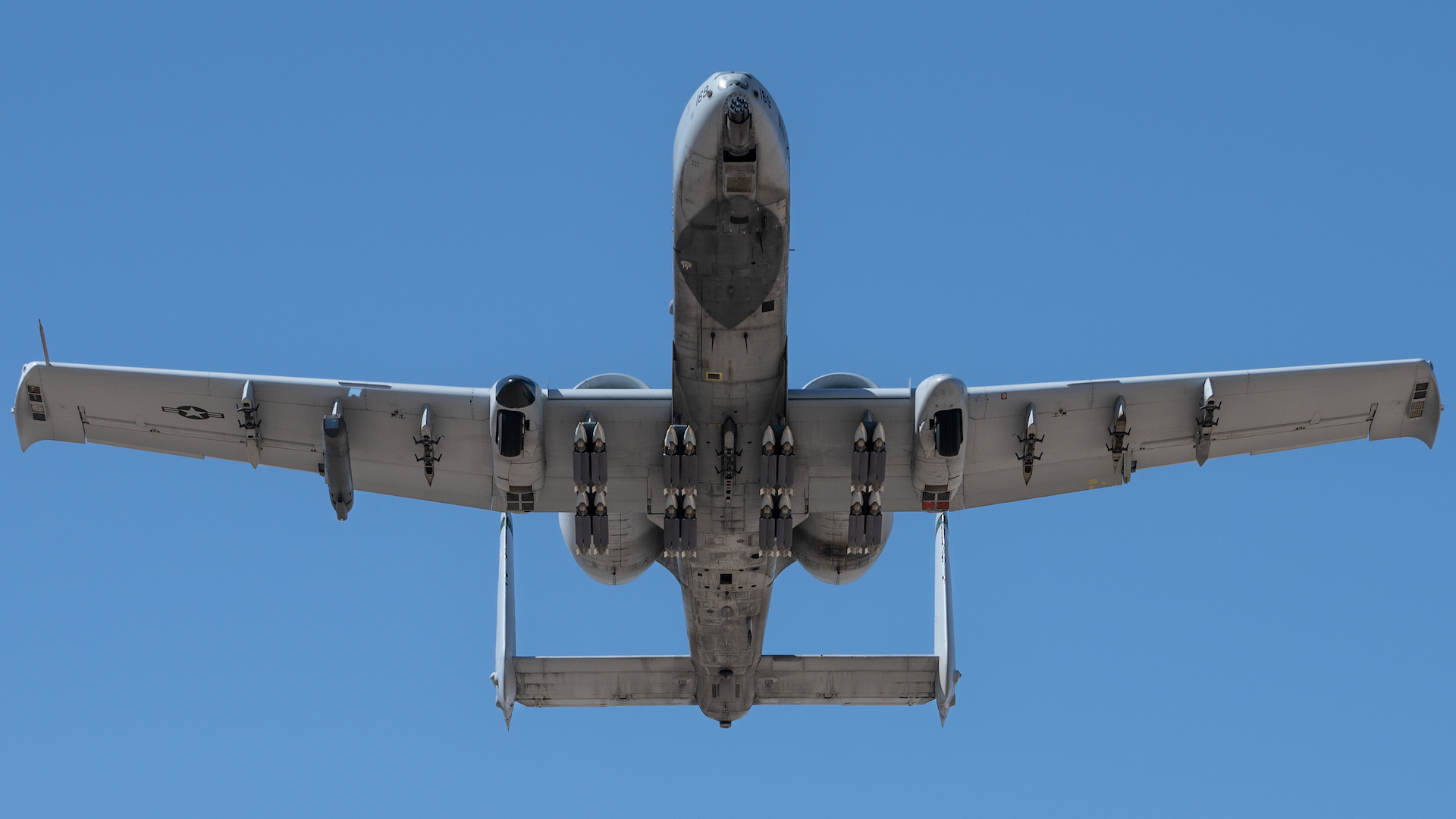

After decades as the go-to close air support platform for U.S. service members deployed overseas in the Global War on Terror, the beloved A-10 Warthog is slowly evolving to meet the complex missions in a potential future near-peer conflict.
And to do that, it needs bombs. Lots of bombs.
Photos recently published to the Defense Department’s Defense Visual Information Distribution System and first spotted by our colleagues at The War Zone show an A-10 Thunderbolt II assigned to the 422nd Test and Evaluation Squadron taking flight with 16 GBU-39/B Small Diameter Bomb (SDB) mounted across four separate BRU-61/A bomb racks during one of several test missions that took place between April 19th and 20th at Nellis Air Force Base in Nevada.
The test was intended to evaluate an updated version of Operation Flight Program 11, a major software upgrade that included a patch to allow an A-10 to support two additional SDB racks. While the 40th Flight Test Squadron had flown an A-10 with 16 SDBs before during developmental testing at Eglin Air Force Base in Florida in February 2022, the Nellis test marked the first time the 422nd TES in particular “carried and employed all four bomb racks of GBU-39/Bs on a single jet” using the new software, according to the DVIDS photo caption.

While the A-10 is mostly known for its beastly 30mm GAU-8/A Avenger rotary cannon (and associated ‘BRRRT’ report), the Warthog already has air-to-surface precision strike capabilities in the form of the AGM-65 Maverick missile and the Joint Direct Attack Munition (JDAM) guidance kit. But as our colleagues at The War Zone note, the 250-pound SDB would provide the A-10 with a significantly improved precision strike capability over ranges up to 40 nautical miles away.
The integration of the SDB into the A-10s — initiated in 2018 under the Air Force’s Common Fleet Initiative raft of upgrades for the airframe — will “give the A-10 a four-fold increase in standoff bomb capability and allows the A-10 to provide weapons effects in much [greater] threat environments than before,” as Maj. Matthew Kading, the A-10 Test Director for the 59th Test and Evaluation Squadron, told The War Zone way back in 2020 while detailing the Warthog’s biggest upgrade in decades.
Subscribe to Task & Purpose Today. Get the latest military news, entertainment, and gear in your inbox daily.
Deploying the A-10 as a bomb-laden precision strike delivery vehicle is a change of pace for an aircraft explicitly designed to provide blistering close air support for friendly ground forces, a design that proved particularly effective during the U.S.-led military campaigns in Iraq and Afghanistan over the last two decades. But with the Pentagon retooling for a possible near-peer conflict with China, Air Force leaders remain convinced the aging airframe would not survive contact with advanced enemy air defenses.
While lawmakers have fought to keep the A-10 flying into the 2030s, keeping the venerable airframe in the fight means finding new mission sets. As A-10C weapons officers Maj. Maurice Grosso argued in Task & Purpose last year, loading up the Warthog with both standoff weapons (relatively long-distance missiles and bombs) and airborne decoys could give the aging aircraft new life in a high-intensity conflict against a sophisticated air defense network.
“The A-10C has up to 10 weapons stations available,” Grosso wrote. “In today’s Air Force, where new fighters have fewer weapons stations in order to prioritize internal carriage and stealth, the A-10’s sheer volume of available weapons stations is a force multiplier.”

Indeed, the Air Force is clearly embracing Grosso’s logic not just with standoff weapons SDB, but with those airborne decoys as well. In December, A-10 pilots from the 74th Fighter Squadron flew from their home at Moody Air Force Base in Georgia to Guam for an integrated strike mission with B-1B Lancer bombers while loaded up with ADM-160 Miniature Air-Launched Decoys (MALD), 300-pound miniature aircraft designed to launch mid-air and duplicate the signature and flight profile of other aircraft to confuse enemy air defenses.
At least one B-1B pilot appreciated the A-10 assist.
“Having a combat-proven platform like the A-10 provide support through their MALD decoys increases the probability that our aircraft and weapons successfully strike their targets,” Maj. Daniel Winningham, a B-1B instructor pilot with the 37th Bomb Squadron, said in a press release about the exercise at the time. “The training opportunities provided by sorties like this are invaluable.”

It’s unclear when A-10s might deploy overseas touting MALDs or SDBs, but one thing is clear from the Warthog’s slow and steady transformation from CAS darling to armored bomb truck: you absolutely can teach an old dog new tricks.
“The A-10 is famous for its 30-millimeter Gatling gun and ability to carry large weapons loads,” as 74th FS squadron commander Lt. Col. Matt Shelly put it in the press release after the MALD exercise. “But we must move beyond the weapons and mission sets that made the A-10 famous in the low-intensity conflicts of the Middle East and accelerate change in this way to be a force multiplier for combatant commanders.”
The latest on Task & Purpose
- New details emerge about Col. Chung, the suspended commander of 5th SFAB
- Navy SEAL doctor astronaut Jonny Kim somehow finds time to become naval aviator
- Russia’s Spetsnaz forces are being annihilated in Ukraine, leaks claim
- 75th Ranger Regiment team wins Best Ranger Competition for third year in a row
- Wagner Group leader calls for end to Russia’s ‘special military operation’
